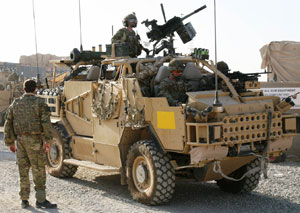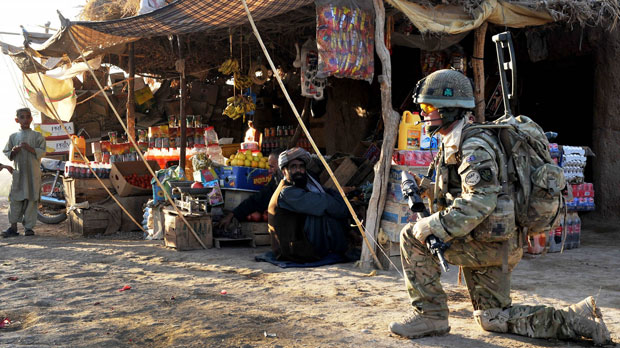Afghanistan: providing for those caught in the crossfire
As war rages in Afghanistan Captain Doug Beattie writes from the frontline for Channel 4 News on how efforts to provide basic necessities for the local population affect the success of the insurgency.

Captain Doug Beattie of 1 Royal Irish Regiment won the Military Cross for bravery in Afghanistan. He writes exclusively for Channel 4 News on his return to the frontline.
Three months gone, three to go. For the men of 1 Royal Irish the halfway point of their tour in Helmand has now come and gone. The end, if not yet quite in sight, lingers just over the horizon. And after more than 90 days in Helmand Province men think not just of when they will go home for good but what they have achieved.
Inevitably, the media measures progress in terms of lives lost and lives taken. And for sure the fighting is a central part of military operations. But fundamentally taking on and defeating the Taliban is an enabling function. It allows for other aspects of soldiering and civilian activity to take place and make a difference to Afghanistan’s 26 million people.
Embedded within 1 R IRISH is the Military Stabilisation Support Team (MSST), a small group of individuals whose expertise lies in reconstruction and development. They work alongside the wiry, battling Irishmen, accompanying them on patrol, speaking to the local population to find out what they want and what they need – the two are not always the same.
Afghanistan is a unique environment, whose inhabitants come from a whole host of ethnic backgrounds, the list of which is as long as your arm. But they share common goals.
But the members of the MSST are facilitators rather than fixers. It is important the Afghans themselves do the things that will improve their existence. We are not in Afghan to create a dependency culture. As the saying goes: “Give me a fish and I will eat for a day. Teach me how to fish and I will eat for a lifetime.”
Reconstruction projects
As Lieutenant Paddy Pratt and his men force back the insurgents from Checkpoint SABAT to the east of A Company’s area he creates time and space for the MSST to do their jobs. One of their number is Chief Petty Officer Gary Holgate. Amongst his regular ‘customers’ is village elder Haji Lal Jan. He has a long wish list but with Gary it is decided priority must be given to the hand operated water pumps that have been defunct for years.
Gary could call on plenty of British military expertise to fix these life-giving devices, but that isn’t the right solution. Better is to work out with Lal Jan how the villagers themselves might solve the problem and only once a plan is in place will Gary stump up the one thing the Afghans really don’t have – the money needed to pay for the parts.
Gary also uses internationally donated money to fund a programme of local works. Unemployed men are paid to clear irrigation ditches and channels vital for a successful harvest. The money stays local and will support the increasing number of shops that are opening up. The commerce feeds on itself and prosperity spreads; slowly of course, but extend it does.

Return to Afghanistan: view an interactive picture gallery of Capt Doug Beattie MC and 1 R IRISH on the frontline
Security
The bazaar in Saidabad is about to reopen, complete with street lighting. Opening in parallel is an army checkpoint. This is important for two reasons. First to provide a military presence that will deter the Taliban from returning, intent as they are on coercing the population and disrupting the commerce. Secondly it shows a partnership between the Afghan and the ISAF soldier. Standing side by side they represent what the Afghan government want for the people in this area and this gives confidence to the new shop owners and those who use the bazaar.
The picture is repeated elsewhere. Paddy does his job, so Gary can carry out his. Then the Afghans are given the means to sustain the change.
Another of Gary’s projects is the construction of a bridge over the canal, replacing the rickety, narrow affair that hampers the transportation of goods being brought to market, and which links Saidabad to Lashkar Gah. Infrastructure, or the lack of it, a problem in Helmand and beyond. The coalition is doing its damnedest to overcome the geographical hurdles and physical threats to movement.
If you can influence the local population – the ordinary ones, the majority who want peace and prosperity – then you can affect the success of the insurgency, separate them from the population.
Influence and effect
What Gary and Paddy are doing is all about influence and effect.
If you can influence the local population – the ordinary ones, the majority who want peace and prosperity – then you can affect the success of the insurgency, separate them from the population.
Afghanistan is a unique environment, whose inhabitants come from a whole host of ethnic backgrounds, the list of which is as long as your arm. But they share common goals.
Most want a better life for their children. Most detest the violence that has engulfed them for generations. The more 1 R IRISH and the others can show the Afghan people that there is another way, the better the chance for stability once we are gone.
Without hope and devoid of opportunity there is nothing to prevent the country sliding back into chaos once we leave. But if Afghans have something to lose they will fight tooth and nail to retain it.
Captain Doug Beattie MC of 1 Royal Irish Regiment is currently deployed in Southern Afghanistan. He is the author of An Ordinary Soldier and Task Force Helmand. Pictures provided by R IRISH media ops. View more here.




